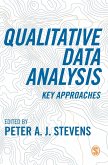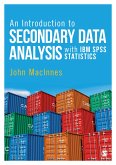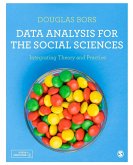'This book provides an excellent reference guide to basic theoretical arguments, practical quantitative techniques and the methodologies that the majority of social science researchers are likely to require for postgraduate study and beyond' - Environment and Planning
'The book provides researchers with guidance in, and examples of, both quantitative and qualitative modes of analysis, written by leading practitioners in the field. The editors give a persuasive account of the commonalities of purpose that exist across both modes, as well as demonstrating a keen awareness of the different things that each offers the practising researcher' - Clive Seale, Brunel University
'With the appearance of this handbook, data analysts no longer have to consult dozens of disparate publications to carry out their work. The essential tools for an intelligent telling of the data story are offered here, in thirty chapters written by recognized experts.' - Michael Lewis-Beck, F Wendell Miller Distinguished Professor of Political Science, University of Iowa
'This is an excellent guide to current issues in the analysis of social science data. I recommend it to anyone who is looking for authoritative introductions to the state of the art. Each chapter offers a comprehensive review and an extensive bibliography and will be invaluable to researchers wanting to update themselves about modern developments' - Professor Nigel Gilbert, Pro Vice-Chancellor and Professor of Sociology, University of Surrey
This is a book that will rapidly be recognized as the bible for social researchers. It provides a first-class, reliable guide to the basic issues in data analysis, such as the construction of variables, the characterization of distributions and the notions of inference. Scholars and students can turn to it for teaching and applied needs with confidence.
The bookalso seeks to enhance debate in the field by tackling more advanced topics such as models of change, causality, panel models and network analysis. Specialists will find much food for thought in these chapters.
A distinctive feature of the book is the breadth of coverage. No other book provides a better one-stop survey of the field of data analysis. In 30 specially commissioned chapters the editors aim to encourage readers to develop an appreciation of the range of analytic options available, so they can choose a research problem and then develop a suitable approach to data analysis.
'The book provides researchers with guidance in, and examples of, both quantitative and qualitative modes of analysis, written by leading practitioners in the field. The editors give a persuasive account of the commonalities of purpose that exist across both modes, as well as demonstrating a keen awareness of the different things that each offers the practising researcher' - Clive Seale, Brunel University
'With the appearance of this handbook, data analysts no longer have to consult dozens of disparate publications to carry out their work. The essential tools for an intelligent telling of the data story are offered here, in thirty chapters written by recognized experts.' - Michael Lewis-Beck, F Wendell Miller Distinguished Professor of Political Science, University of Iowa
'This is an excellent guide to current issues in the analysis of social science data. I recommend it to anyone who is looking for authoritative introductions to the state of the art. Each chapter offers a comprehensive review and an extensive bibliography and will be invaluable to researchers wanting to update themselves about modern developments' - Professor Nigel Gilbert, Pro Vice-Chancellor and Professor of Sociology, University of Surrey
This is a book that will rapidly be recognized as the bible for social researchers. It provides a first-class, reliable guide to the basic issues in data analysis, such as the construction of variables, the characterization of distributions and the notions of inference. Scholars and students can turn to it for teaching and applied needs with confidence.
The bookalso seeks to enhance debate in the field by tackling more advanced topics such as models of change, causality, panel models and network analysis. Specialists will find much food for thought in these chapters.
A distinctive feature of the book is the breadth of coverage. No other book provides a better one-stop survey of the field of data analysis. In 30 specially commissioned chapters the editors aim to encourage readers to develop an appreciation of the range of analytic options available, so they can choose a research problem and then develop a suitable approach to data analysis.








